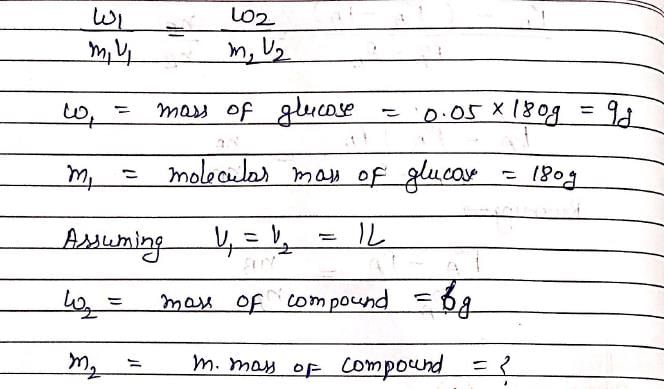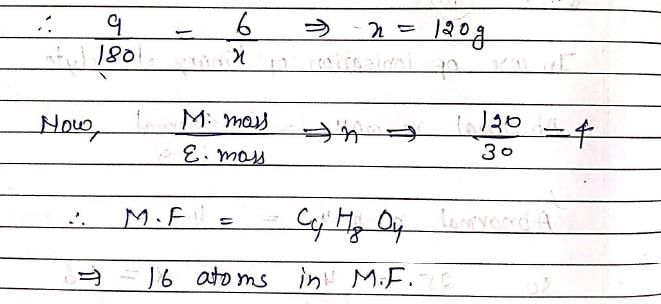Chemistry Exam > Chemistry Questions > The empirical formula of a non-electrolyte is...
Start Learning for Free
The empirical formula of a non-electrolyte is CH2O. A solution containing 6 g of compound exerts the same osmotic pressure as that of 0.05 M glucose solution at same temp. The molecular formula of compound has …….number of atoms in it:
Correct answer is '16'. Can you explain this answer?
| FREE This question is part of | Download PDF Attempt this Test |
Verified Answer
The empirical formula of a non-electrolyte is CH2O. A solution contain...



Most Upvoted Answer
The empirical formula of a non-electrolyte is CH2O. A solution contain...
A molecular weight of 90 g/mol.
First, we need to find the molar mass of the compound represented by the empirical formula CH2O:
Molar mass = (12.01 x 1) + (1.01 x 2) + 16.00 = 30.03 g/mol
Next, we can calculate the number of moles of the compound in the solution containing 6 g:
moles = mass / molar mass = 6 g / 30.03 g/mol = 0.1999 mol
Since the osmotic pressure is the same as that of a 0.05 M glucose solution, we can use the van't Hoff factor (i) to calculate the effective concentration of the compound:
i = (osmotic pressure of the solution containing the compound) / (osmotic pressure of a 0.05 M glucose solution)
Assuming both solutions are at the same temperature and volume, the osmotic pressure is directly proportional to the concentration. Therefore:
i = (concentration of the compound) / 0.05 M
Since the compound is a non-electrolyte, i = 1. Therefore:
0.1999 mol / 0.05 M = 3.998 M
Finally, we can use the molar mass and the effective concentration to calculate the molecular formula of the compound:
molecular weight = molar mass x n
n = molecular weight / molar mass = 90 g/mol / 30.03 g/mol = 2.997
The molecular formula is therefore (CH2O)3 or C3H6O3.
First, we need to find the molar mass of the compound represented by the empirical formula CH2O:
Molar mass = (12.01 x 1) + (1.01 x 2) + 16.00 = 30.03 g/mol
Next, we can calculate the number of moles of the compound in the solution containing 6 g:
moles = mass / molar mass = 6 g / 30.03 g/mol = 0.1999 mol
Since the osmotic pressure is the same as that of a 0.05 M glucose solution, we can use the van't Hoff factor (i) to calculate the effective concentration of the compound:
i = (osmotic pressure of the solution containing the compound) / (osmotic pressure of a 0.05 M glucose solution)
Assuming both solutions are at the same temperature and volume, the osmotic pressure is directly proportional to the concentration. Therefore:
i = (concentration of the compound) / 0.05 M
Since the compound is a non-electrolyte, i = 1. Therefore:
0.1999 mol / 0.05 M = 3.998 M
Finally, we can use the molar mass and the effective concentration to calculate the molecular formula of the compound:
molecular weight = molar mass x n
n = molecular weight / molar mass = 90 g/mol / 30.03 g/mol = 2.997
The molecular formula is therefore (CH2O)3 or C3H6O3.

|
Explore Courses for Chemistry exam
|

|
Similar Chemistry Doubts
The empirical formula of a non-electrolyte is CH2O. A solution containing 6 g of compound exerts the same osmotic pressure as that of 0.05 M glucose solution at same temp. The molecular formula of compound has …….number of atoms in it:Correct answer is '16'. Can you explain this answer?
Question Description
The empirical formula of a non-electrolyte is CH2O. A solution containing 6 g of compound exerts the same osmotic pressure as that of 0.05 M glucose solution at same temp. The molecular formula of compound has …….number of atoms in it:Correct answer is '16'. Can you explain this answer? for Chemistry 2024 is part of Chemistry preparation. The Question and answers have been prepared according to the Chemistry exam syllabus. Information about The empirical formula of a non-electrolyte is CH2O. A solution containing 6 g of compound exerts the same osmotic pressure as that of 0.05 M glucose solution at same temp. The molecular formula of compound has …….number of atoms in it:Correct answer is '16'. Can you explain this answer? covers all topics & solutions for Chemistry 2024 Exam. Find important definitions, questions, meanings, examples, exercises and tests below for The empirical formula of a non-electrolyte is CH2O. A solution containing 6 g of compound exerts the same osmotic pressure as that of 0.05 M glucose solution at same temp. The molecular formula of compound has …….number of atoms in it:Correct answer is '16'. Can you explain this answer?.
The empirical formula of a non-electrolyte is CH2O. A solution containing 6 g of compound exerts the same osmotic pressure as that of 0.05 M glucose solution at same temp. The molecular formula of compound has …….number of atoms in it:Correct answer is '16'. Can you explain this answer? for Chemistry 2024 is part of Chemistry preparation. The Question and answers have been prepared according to the Chemistry exam syllabus. Information about The empirical formula of a non-electrolyte is CH2O. A solution containing 6 g of compound exerts the same osmotic pressure as that of 0.05 M glucose solution at same temp. The molecular formula of compound has …….number of atoms in it:Correct answer is '16'. Can you explain this answer? covers all topics & solutions for Chemistry 2024 Exam. Find important definitions, questions, meanings, examples, exercises and tests below for The empirical formula of a non-electrolyte is CH2O. A solution containing 6 g of compound exerts the same osmotic pressure as that of 0.05 M glucose solution at same temp. The molecular formula of compound has …….number of atoms in it:Correct answer is '16'. Can you explain this answer?.
Solutions for The empirical formula of a non-electrolyte is CH2O. A solution containing 6 g of compound exerts the same osmotic pressure as that of 0.05 M glucose solution at same temp. The molecular formula of compound has …….number of atoms in it:Correct answer is '16'. Can you explain this answer? in English & in Hindi are available as part of our courses for Chemistry.
Download more important topics, notes, lectures and mock test series for Chemistry Exam by signing up for free.
Here you can find the meaning of The empirical formula of a non-electrolyte is CH2O. A solution containing 6 g of compound exerts the same osmotic pressure as that of 0.05 M glucose solution at same temp. The molecular formula of compound has …….number of atoms in it:Correct answer is '16'. Can you explain this answer? defined & explained in the simplest way possible. Besides giving the explanation of
The empirical formula of a non-electrolyte is CH2O. A solution containing 6 g of compound exerts the same osmotic pressure as that of 0.05 M glucose solution at same temp. The molecular formula of compound has …….number of atoms in it:Correct answer is '16'. Can you explain this answer?, a detailed solution for The empirical formula of a non-electrolyte is CH2O. A solution containing 6 g of compound exerts the same osmotic pressure as that of 0.05 M glucose solution at same temp. The molecular formula of compound has …….number of atoms in it:Correct answer is '16'. Can you explain this answer? has been provided alongside types of The empirical formula of a non-electrolyte is CH2O. A solution containing 6 g of compound exerts the same osmotic pressure as that of 0.05 M glucose solution at same temp. The molecular formula of compound has …….number of atoms in it:Correct answer is '16'. Can you explain this answer? theory, EduRev gives you an
ample number of questions to practice The empirical formula of a non-electrolyte is CH2O. A solution containing 6 g of compound exerts the same osmotic pressure as that of 0.05 M glucose solution at same temp. The molecular formula of compound has …….number of atoms in it:Correct answer is '16'. Can you explain this answer? tests, examples and also practice Chemistry tests.

|
Explore Courses for Chemistry exam
|

|
Suggested Free Tests
Signup for Free!
Signup to see your scores go up within 7 days! Learn & Practice with 1000+ FREE Notes, Videos & Tests.


















